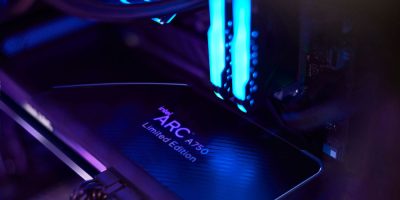Rutronik adds Intel Arc A750 graphics cards for gaming and content creation
Intel’s first generation Arc graphics cards, the Arc A750 series, are available from Rutronik. The graphics cards are based on the Alchemist chip architecture and is intended for gaming and content creators and any other applications where high-performance graphics are in demand.
The cards are equipped with 28 Xe cores and clock at 2050MHz. They have 8Gbyte of GDDR6 memory.
The cards benefit from Intel’s AI-enhanced XeSS (Xe Super Sampling technology) to enable more performance with high image fidelity. According to Rutronik, they bring the gaming experience “to a completely new level” through XMX AI hardware acceleration. The cards also support the latest graphics technologies such as ray tracing, variable rate shading, mesh shading, and sampler feedback.
Enhanced by AI and accelerated by Intel Deep Link technology, using the A750 as a media engine opens up a range of possibilities for creating rich digital content. It is currently the first graphics card to support all leading media formats and is even capable of interacting with the latest AV1 video encoding features, claimed Rutronik.
Virtual streaming technologies built into Intel Arc Control provides flexibility with control for an optimal live streaming experience, said the company. It is easy to set up a streaming studio with virtual background, auto-framing, and broadcasting options, for example, said Rutronik, all of which is accessible through an intuitive software interface.
The graphics cards have controllable RGB LEDs and feature stealth black I/O mount and a 15-blade dual axial fan and vapour chamber cooling for quiet acoustics.
Rutronik Elektronische Bauelemente was founded in 1973 and is an independent family-owned company based in Ispringen, Germany. The broadline distributor has more than 80 offices worldwide and logistics centres in Austin (Texas), Shanghai, Singapore, and Hong Kong, for customer support in Europe, Asia, and North America.
The company focuses on high-growth future markets that will shape the world of electronics tomorrow, namely advanced materials, advanced measurement, processing and analytics, advanced robotics, automation, biotechnology, energy and power, future mobility, IIoT and internet of everything, industry 4.0, medical and healthcare, and transportation, logistics and supply chain.




